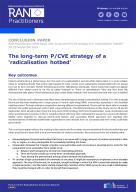Details
- Publication date
- 3 May 2022
- Author
- Directorate-General for Migration and Home Affairs
- RAN Publications Topic
- Local strategies/cities
Description
Violent extremism is a global issue, but the start of a radicalisation process often takes place in a local context. Cities or neighbourhoods that at first sight appear to have similar socio-geographic characteristics do not always turn out to be a similarly ‘fertile’ breeding ground for radicalising individuals.
Some areas that might not appear different from others come to be the so-called ‘hotbeds’ or ‘hubs’ of radicalisation. Why and how does this development take place? Which elements at play create these hotbeds? And how does one deal with such a hotbed? The city of Dortmund in Germany has often been characterised as being a radicalisation hotbed.
For over a decade Dortmund has been dealing with a large group of violent right-wing (VRW) extremists, especially in the Dorstfeld neighbourhood. Through intensive cooperation among different organisations, Dortmund has been able to severely diminish the public presence of violent right-wing extremists.
The RAN Practitioners online study visit on 28 and 29 September 2021 aimed to learn from the long-term P/CVE strategy Dortmund implemented. Local coordinators and other practitioners involved in a city or neighbourhood with long-term radicalisation issues from various EU Member States came together to discuss Dortmund’s history and successful P/CVE approach and together with representatives of relevant stakeholder organisations drew lessons from its successes and from what could have gone better.
This conclusion paper reflects the meeting’s discussions and formulates recommendations for (local) authorities and other practitioners faced with a local concentration of violent extremists. Key outcomes from the meeting were:
- Acknowledgment by local authorities that there is an issue with (a large amount of) violent extremists in their city or region, is a key prerequisite for successfully handling the issue.
- Cooperation between the ‘triangle’ of police, local authorities and civil society is essential and in order for this cooperation to be successful, there needs to be:
- Respect and transparency among the cooperating partners;
- Time and funds to build up a long-term coordinated approach;
- Trust among the partners and among citizens towards the institutions.
- To counter a high concentration of extremists in one area, it might be necessary to implement a non-standard approach. The city of Dortmund, for example, bought buildings in which the VRW extremists wanted to create a ‘national centre’, and the police started prosecuting members of the VRWE group for any small misdemeanour they could be charged with, in order to disrupt their expansion.

